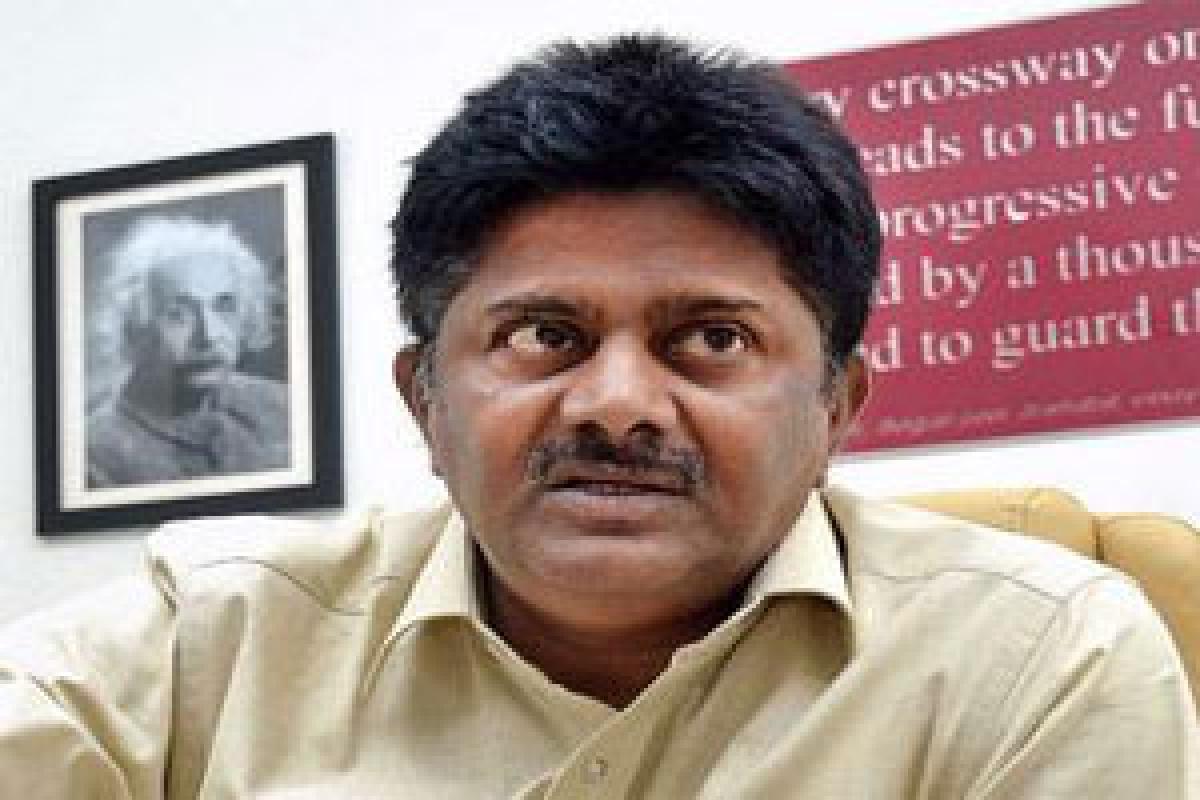Live
- Infighting again erupts in Trinamool on chair of West Bengal Medical Council
- Maha: Candidate, poll worker and voter die as skirmishes, stray violence mar peaceful voting
- Rajnath Singh Meets Chinese Defence Minister Dong Jun In Vientiane Amid Border Disengagement Developments
- Stalin Urges Jaishankar To Secure Release Of 14 Indian Fishermen Detained By Pakistan Navy
- 13-Year-Old Girl Raped By Three Men Out On Bathroom Break
- Sivaji launches lyrical song ‘Vassahi Vassahi’ from ‘Mr Idiot’
- Mohanlal and Mammootty unites after two decades
- ‘Sankranthiki Vasthunnam’ locks release date
- How Individuals Can Contribute to Environmental Conservation Efforts and Make a Difference
- Smart Logistics: Leveraging AI for Real-Time Decision Making and Route Optimization
Just In

The TDP regime, feeling the heat of public unrest marked by massive protests over displacement caused by rapid industrialisation and urbanisation in the post-bifurcation in the state, seems finding solace in certain provisions in the Indian Penal Code (IPC) and the Indian Police Act.
Vijayawada: The TDP regime, feeling the heat of public unrest marked by massive protests over displacement caused by rapid industrialisation and urbanisation in the post-bifurcation in the state, seems finding solace in certain provisions in the Indian Penal Code (IPC) and the Indian Police Act.
AP Director General of Police N Sambhasiva Rao’s recent statement on blanket ban on pada yatras and public rallies organized by the Opposition parties and pressure groups with the invocation of the section30 of the Indian Police Act smacks of this impression. Strikingly, the DGP’s statement came close on the heels of Kapu leader Mudragada Padmanabham’s proposed pada yatra from Ravulapalem to Antarvedi from November 16.
Sambhasiva Rao cited the arson and violence that broke out during Tuni’s Kapu Garjana led by Padmanabham as the reason for invoking the section 30. He went on record that pada yatras in caste-sensitive areas like Amalapuram in East Godavari district might incite violence and social tensions.
Coincidentally, a cluster of villages surrounding Thundurru near Bhimavaram in West Godavari district which became a centre of anti-food park protests, keeps reeling under the shadow of the section 44 of the Cr PC (Criminal Procedure Code). This section was invoked by the police to restore ‘peace’ after violent protests by people opposing the food park under the leadership of the Left parties.
Prohibitory orders have also been clamped down at Ontimamidi village under Thondangi mandal in East Godavari district as a sequel to the massive protests against Divi’s pharma industry which is accused of polluting the environment.
Kovvada under Ranashalam mandalam in Srikakulam district and Kavali in Nellore district where two nuclear power plants are proposed to come up have become a hotbed for protests. Midnight swoops and preventive arrests have become almost a daily routine in Kovvada and Thondangi areas in the last few days.
What is Indian Police Act?
The Indian Police Act, 1861, containing the section 30, is a colonial Act introduced by the British regime to suppress the nationalist movement. Later, it was inherited by the successive governments after the Independence. Besides, the sections 188 of the IPC and the 151 of the Cr PC are reportedly being invoked quite often enabling the police authorities to register cases suo motu against the people posing a `potential’ danger to the law and order.
When the intervention of the executive magistrates such as the district collector, revenue divisional officers and Tahasildars is warranted for invocation of the section 144 of the IPC, the section 30 of the Indian Police Act empowers the police authorities to impose prohibitory orders directly without depending on the executive magistrates.
In realization of its ambitious dream of turning the state into sunrise AP, the TDP government is vigorously pursuing industrialization with creation of land bank with 13 lakh acres. In the process, the projects such as ports and airports and nuclear power plants are set to leave thousands of farmers alienated from their lands. This causes unrest in different sections, giving the feed to the opposition to fix the ruling establishment.
The government appears to be left with no option but to handle the public protests with the help of police, it is alleged. CPI (M) state secretary Madhu wrote to the DGP expressing his resentment against the use of the section 30 of the Indian Police Act to stifle the opposition’s voice.
The Human Rights Forum leader VS Krishna said the particular section has become a tool at the hands of the ruling establishments to suppress the public voice. He said the Act runs counter to free speech, a fundamental right guaranteed by the constitution.
By G Nagaraja

© 2024 Hyderabad Media House Limited/The Hans India. All rights reserved. Powered by hocalwire.com







